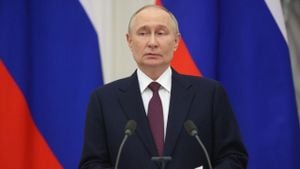Recent developments concerning the arms sale from the United States to Taiwan have sparked considerable interest and concern globally, particularly from China. The U.S. government endorsed a substantial arms package intended for Taiwan, aiming to bolster its defense capabilities amid rising tensions with China. This decision is seen as part of the U.S. commitment to support Taiwan's self-defense.
The proposed arms sale comprises advanced weaponry, including anti-aircraft systems and missiles, which are particularly significant considering the deteriorated state of relations between China and Taiwan. This move also aligns with the broader U.S. strategy to reinforce its alliances and deter aggression from China, which has escalated military maneuvers near Taiwan.
Beijing reacted sternly to the announcement. The Chinese government expressed strong disapproval, claiming such actions threaten regional stability and provoke unnecessary tensions. China perceives Taiwan as part of its territory, and the prospect of the U.S. increasing its military ties with Taiwan is viewed as crossing a red line.
Experts suggest this arms deal is strategically important not only for Taiwan's defense but also for U.S.-China relations. Analysts argue the sale could complicate the already tense interactions between Washington and Beijing, making diplomatic resolutions more challenging. After all, both nations are vying for influence in the Asia-Pacific region, which is becoming increasingly militarized.
Adding to the complexity, language used by U.S. officials appears to indicate Washington's intentions to fortify its stance on defending allies against potential aggressors. Senator Bob Menendez, chair of the Senate Foreign Relations Committee, was quoted saying, "The Biden administration is committed to strengthening Taiwan's defense capabilities as part of its larger commitment to the Indo-Pacific."
Officials from Taiwan celebrated the U.S. arms initiative, viewing it as validation of their vigilance against increasing Chinese pressure. Taiwan’s President Tsai Ing-wen emphasized, "We must continue to strengthen our ability to defend ourselves, and this arms package from the U.S. plays a key role." This perspective reinforces Taiwan's stance of independence amid fears of Chinese aggression.
The consequence of this arms deal extends beyond immediate military hardware. It signifies the U.S. continues to reject the idea of any 'one China' principle imposed by Beijing, which could have broader ramifications. Some analysts warn this could inadvertently invite more aggressive reactions from Beijing, including increased military exercises near the Taiwan Strait or enhanced rhetorical confrontations.
Critically, this decision may influence the calculus of other nations watching how both the U.S. and China respond. Countries within the Asia-Pacific, particularly those with their own fraught relations with China, could react by consolidatively strengthening their military partnerships with the U.S.
Public opinion on this issue varies. Some Americans express concern about the risks of entangling the U.S. military directly with potential conflict scenarios involving Taiwan. Others view it as necessary support for democracy and self-determination, emphasizing the importance of standing up to potential authoritarian aggressors.
The historical backdrop is also noteworthy. Taiwan has long been viewed as the most dangerous flashpoint between the U.S. and China, dating back decades. Ever since the Chinese Civil War, which led to the retreat of the Kuomintang party to Taiwan and the establishment of the People's Republic of China, the cross-strait relations have been tumultuous and fraught with contention.
With the global spotlight now trained on the situation, all eyes are on how this arms package will transform the dynamics of U.S.-China relations and Taiwan's situation. Observers are waiting to see if China will ramp up its military presence or diplomatic pressures as fallout from the agreement.
Overall, the U.S. decision to proceed with the arms sale to Taiwan signals both commitment and potential peril, entwining geopolitical interests with domestic concerns over military involvement abroad. The ramifications of this sale are likely to extend far beyond the immediate transaction, influencing political, economic, and military landscapes throughout the region and beyond.



